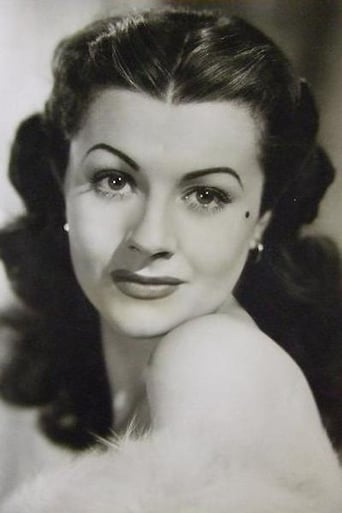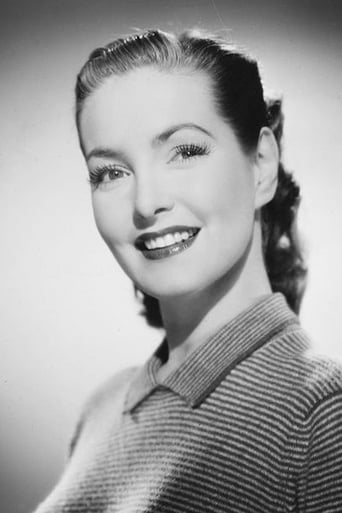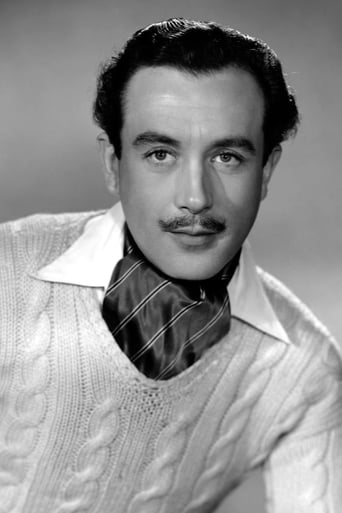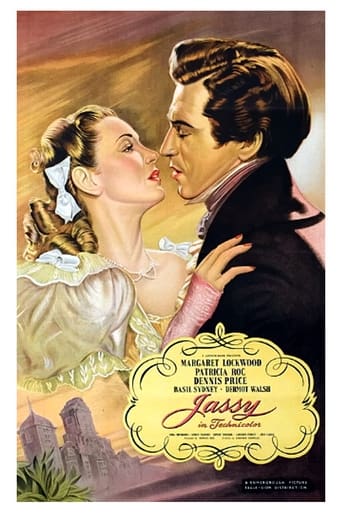
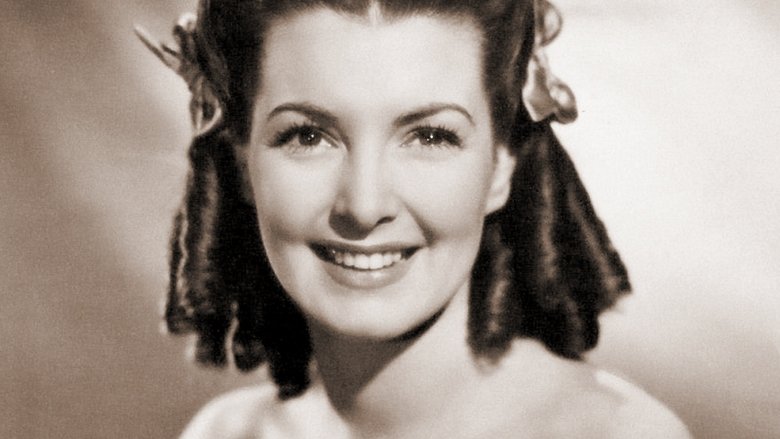
Jassy (1947)
In 19th century England, Jassy is a young Gypsy girl blessed with the gift of second sight. Pursued by superstitious villagers, she is rescued by the son of the owner of Mordelaine, a vast stately home. Unfortunately, his father's drinking and gambling threaten the very ownership of the house. Despite her humble origins as a servant girl, Jassy must try to use her talents to climb the social ladder and save Mordelaine for the man whom she loves.
Watch Trailer
Cast
Reviews
You won't be disappointed!
Pretty Good
Powerful
If the ambition is to provide two hours of instantly forgettable, popcorn-munching escapism, it succeeds.
"Jassy" was one of a number of historical melodramas made in Britain by Gainsborough Pictures during the 1940s. ("The Wicked Lady" is another well-known example). The action takes place in the early nineteenth century. The main characters are Christopher Hatton, a country squire, Nicholas Helmar, another wealthy gentleman, Hatton's son Barney, Helmar's attractive but flighty daughter Dilys and the title character Jassy Woodroffe, a beautiful gypsy girl. Jassy has the gift of second sight, something which causes her to be regarded as a witch by local people, who want to throw her into the village duckpond to see if she floats or not. (Witchcraft had officially ceased to be regarded as a crime in Britain in 1735, but folk-superstitions like this died hard. The last extra-judicial killing of a suspected witch took place, according to some accounts, as recently as 1945).The name "Jassy" is short for "Jacinth"; it is not a corruption of "Jessie". She claims that her name is taken from the Bible, and although there is no Biblical character named Jacinth the word is used in the Bible, at least in some translations, to mean a type of jewel.The plot goes though too many twists and turns for me to set out anything like a full synopsis here. The film opens with Hatton, an obsessive gambler, losing his stately home, Moderlaine, to Helmar while gambling. Much of the story revolves around Barney Hatton's attempts to regain Moderlaine for his family, as well as his romantic liaisons with both Jassy and Dilys Helmar. Along the way there is also a suicide, an attempted elopement, an unexpected marriage, a murder, another killing (which could be either murder or manslaughter but in respect of which the perpetrator is never prosecuted) and a dramatic trial scene.As was normal with Gainsborough melodramas (indeed, with melodramas in general), the acting is exaggerated and stylised. In some contexts over-acting can be a vice, but in a film like this one it is what we have come to expect- so much so that anyone attempting to give a naturalistic performance would look out-of-place. Margaret Lockwood, who also starred in "The Wicked Lady", makes Jassy an appealing heroine, not only beautiful but also spirited, intelligent and capable. Perhaps the best performance comes from Basil Sydney as Nicholas Helmar, a wicked Squire Jasper in the best melodramatic tradition.Most Gainsborough films were made in black-and-white, as were some American historical melodramas, such as "Dragonwyck", from the same period. The use of monochrome for costume dramas, a genre which seems to cry out for bold colours, must seem very strange to the modern viewer, but in the 1940s the economics of film production was very different to what it is now. The use of expensive colour film could add a considerable amount to the cost of a movie, a cost which could not always be recouped at the box office. Although there were some notable exceptions, such as Olivier's "Henry V", this was particularly true of Britain during the economic privations of the wartime years.By 1947, however, the war was over and, although complete economic recovery was still a long way off, some film-makers felt they could be more adventurous. Jassy" was made in Technicolor, which on this occasion did pay off, both economically- the film was a box-office hit- and artistically because the use of colour really does add a dimension to the film which it would otherwise have lacked. With its exciting, incident-packed plot, its lovely heroine, its detestable villain and a happy ending "Jassy" is a fine example of the historical melodrama. 7/10 Some goofs. To judge from the costumes the action of this film would appear to take place during the 1820s or 1830s. Before the passing of the Married Women's Property Acts or 1870 and 1882 married women could not own property in their own right, so one of the key plot points- Jassy's agreement to marry Helmar if he will make Moderlaine over to her- just does not work in a legal sense. Even if he had transferred the land to her while she was still single, it would have reverted to him as soon as they married. The version of the Royal Arms we see displayed in court during the trial scene was one which had ceased to be used in 1801.
Set in the 1830s, in elegant period costume, JASSY is a very English tale of love, hate, marriage, adultery, sadistic husbands, scheming wives, whip-wielding fathers, capricious lovers, unrequited love, gambling addicts, snobbery, class antagonism, bigotry, a girls' boarding school, country houses and masters and servants. Oh, and two murders, one by poisoning. And a suicide. It would be nice to add: - and all in the first reel. Well, not quite.Bernard Knowles, a distinguished cameraman turned moderate director, makes something of a jumble of the first half hour, introducing too many characters and failing to distinguish those with an important part to play. It seems at first, for example, that the splendid Linden Travers as Lady Helmar will be a major protagonist, but she disappears after a couple of scenes, a typical waste of her talents. It's only with Barney's rescue of Jassy that Knowles starts to pull the disparate threads together.Margaret Lockwood is wonderful as Jassy, the remarkable, psychic, gypsy girl with immaculate English enunciation, though brought up and tutored solely by her father, the resolutely Scottish John Laurie. Coping well enough as the disadvantaged young woman working at the finishing school, she really gets into her stride as the whip-cracking - metaphorically speaking - mistress of the manor house. Looking, as she does, the epitome of glamour, it's no wonder lecherous landowner Helmar - Basil Sydney - finds it difficult to keep his hands off her. Strutting around like an overfed turkey-cock he's entertaining throughout; both he and Lockwood kept getting the giggles in their highly-charged scenes together, setting each other off, causing several re-takes. No doubt some of the corny dialogue didn't help and later, in the court-room scene, Alan Wheatley uses the old acting technique of speaking very slowly and deliberately, to take the curse off a particularly trite sentence. Matching Margaret in the glamour stakes, Patricia Roc 'The Goddess of the Odeons' is excellent as the fickle, opportunistic Dilys, a welcome contrast to her goody-goody Caroline in THE WICKED LADY. The young Dermot Walsh is convincing as one of the few wholly honest characters. All this and Dennis Price, Esma Cannon, then around fifty but playing the much younger Lindy and Ernest Thesiger too.Thought lost for many years, JASSY was located and restored in the early 1980s, receiving its first British TV transmission in December 1984 on Channel Four. I should love the opportunity to see Jassy and Dilys on the big screen and the continuing lack of a DVD release remains a mystery. Certainly for Margaret Lockwood fans, JASSY is a film to see again. And again...
In 1947 the Labour Government imposed an ad valorem tax on the receipts of American film distributors to stop the flow of sterling out of the country.The Americans boycotted Britain and the government asked Rank to fill the void and he in turn Tasked Sydney Box to churn out dozens of films to show in his cinemas.unfortunately when the films were ready to show the government reached agreement with the Americans who then flooded the market with their films and British films were swamped out of the cinemas.So it is little surprise that this film was the last of the line.It seems to borrow all the best bits from its predecessors eg horse whipping,dissolute behaviour gypsy warnings and second sight.The problem is that there are too many bad bits in between.Curious that Dennis Price is top billed but blows his brains out after 20 minutes.marvellous to look at but overlong and at times dull.
As a cameraman Bernard Knowles worked on some decent British films from the Silent Era through to Talkies but may have been misguided in taking on the role of Director and with only a handful of features to his credit, mostly unsatisfying - Easy Money for example - he saw out his career behind the camera on television series. Jassy came at the tail-end of the Gainsborough years and was the first time the outfit had utilised Technicolor. It's a bit of a dog's breakfast all round, never really convincing in ANY genre it flirts with. Basil Sydney, stepping into a role that James Mason could have phoned in, gave no indication that within the year he would be turning in a fine Claudius opposite Olivier's Hamlet, Margaret Lockwood DOES phone in her titular role and Patricia Roc and Dermot Walsh make no real attempt to offer anything other than cardboard cutouts. It was apparently savaged by the critics but popular with the masses at the time; well, they HAD just been through a major war.
